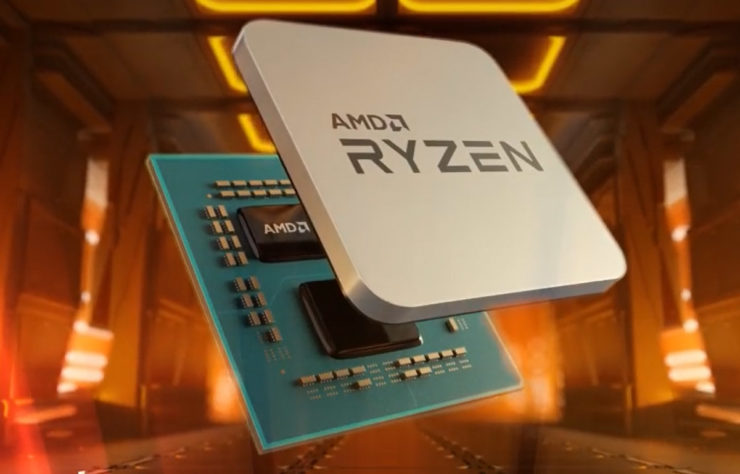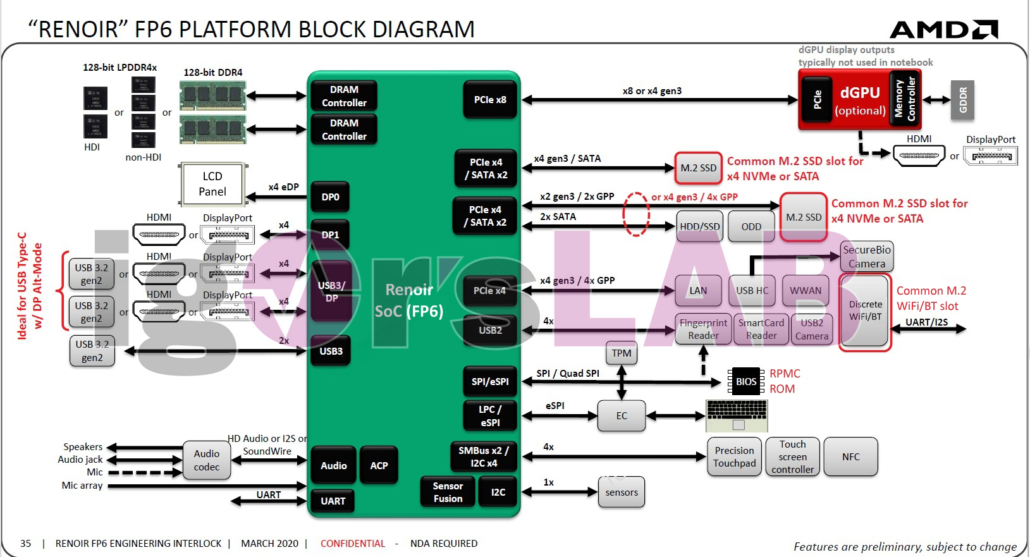
AMD’s Renoir SOC has just got its first legitimate platform block diagram leaked courtesy of the venerable Igor over at Igor’s Lab. The source in question has a spotless track record with leaks and we have no reason to doubt the legitimacy of the slide. The AMD Renoir SoC block diagram (for the mobility platform) reveals that dedicated GPUs will only have access to 8 lanes of PCIe 3.0 which could run high-end GPUs into a bandwidth bottleneck (think RTX 2060 Super and above).
AMD Renoir ‘mobility’ SoC utilizes only 8 PCIe 3.0 lanes for discrete graphics, could turn the tide towards Intel TGL-based gaming laptops in the high-end segment
Interestingly, this limitation does not apply to desktop (AM4-based) Renoir SOC as confirmed by Robert Hallock. The reason appears to be that while the AM4-based platform has access to 16 lanes of PCIe 3.0, the mobility platform is using a crippled version of the SoC for energy efficiency purposes and will only be able to utilize 8 lanes for a dedicated GPU. This amount of bandwidth is enough for GPUs up to a RTX 2060 Super (which is the limit) and might explain why all the configurations of AMD Renoir laptops we saw topped out at an NVIDIA RTX 2060.

Most pertinently perhaps, this is something that could turn the tide of high-end gaming laptops to Intel’s camp once again. Intel’s Tiger Lake is not only going to get at least 16x lanes available for discrete graphics but should also feature some lanes on the new PCIe 4.0 standard. The fact that AMD Renoir will not be able to support high-end GPUs such as the RTX 2070 and above (and even big Navi variants when AMD decides to release them) will see Intel most likely retain its gaming crown in the laptop space till we see a worthy successor from AMD.
Support for GDDR6 is also confirmed with the block diagram as well as the rest of the lane distribution for the platform. Thankfully, storage is supported on dedicated lanes so plugging in an NVME SSD should not cripple the discrete graphics to just 4x PCIe lanes. USB 3.2 gen2 is also supported natively and dual-channel DRAM controllers are included as well.

It looks like AMD’s Renoir platform is aiming dead center for the mainstream market and delivering on the promise that the company has constantly upheld: reducing cost for the average gamer. If you are someone that is not planning to buy a GPU more powerful than the RTX 2060S than AMD’s Renoir is going to offer incredible value; but if you want something with a bit more power, then Intel’s TGL might be your only option in this space and under 16/14nm.
The introduction of Renoir based laptops in the market should see Intel dragged into a price war that will force it to either 1) cut prices as well or 2) yield market share for the mainstream segment as AMD offerings are usually much cheaper than Intel counterparts. AMD processors have also shifted to TSMC’s 7nm process and so far they have been outpacing Intel although we expect the latter to be on a more even footing with 10nm – which TGL is based on.
Intel Tiger Lake will also be rocking a mammoth integrated GPU (which is essentially the DG1 in an integrated form) with 768 cores based on Xe graphics and a TFLOP count that is more powerful than the PS4. Both AMD and Intel have gotten very serious with integrated GPUs and things are about to heat up as we enter into the second half of 2020.







More Stories
AMD Radeon RX 6800 XT “Big Navi” GPU Alleged 3DMark Benchmarks Leaked – Faster Than GeForce RTX 3080 at 4K, Slower In Port Royal Ray Tracing
AMD Ryzen 7 5800H 8 Core & 16 Thread Cezanne ‘Zen 3’ High-Performance CPU Shows Up, Early ES Chip With 3.2 GHz Clocks
BitFenix Announces Two New Cases, The Nova Mesh SE and the Nova Mesh SE TG